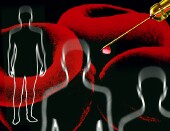Genetic Test Predicts Response to Warfarin
Using it could save money and lives, expert says.
By Ed Edelson
HealthDay Reporter
|
E-mail this article
Subscribe to news
Printer friendly version
|

(SOURCES: Raymond Woosley, M.D., Ph.D., president, Critical Path Institute, Tucson, Ariz.; C. Michael Stein, M.D., professor, medicine and pharmacology, Vanderbilt University, Nashville, Tenn.; Dina Paltoo, Ph.D., M.P.H., Health Scientist Administrator, Division of Heart and Vascular Diseases, National Heart, Lung, and Blood Institute, Bethesda, Md.; March 6, 2008, New England Journal of Medicine)
WEDNESDAY, March 5 (HealthDay News) -- Variations of a gene that determines a person's sensitivity to warfarin are important in determining the initial doses of the anti-clotting drug, researchers report.
That information already is being put to medical use. Last August, the U.S. Food and Drug Administration changed the labeling to say that doctors should consider a genetic test when first prescribing warfarin, better known by its brand name, Coumadin.
"This test can save $1.1 billion in health-care costs and 18,000 lives a year," said Dr. Raymond Woosley, president of the Critical Path Institute, a private organization that is working with the FDA and the biotechnology industry on the subject.
The FDA estimates that 2 million Americans take warfarin to prevent potentially dangerous blood clots. Reasons range from implantation of an artificial heart valve to the abnormal heartbeat called atrial fibrillation.
But warfarin is a notoriously difficult drug to manage, especially at the start. Too much can lead to hemorrhages; too little can allow clots to form. One individual may do well on 1.5 milligrams a day, while another may require 20 milligrams daily.
Some medical centers run elaborate tests to determine the starting dose, but "the standard way is to start with 5 milligrams, then titrate the doses according to blood tests that show the response to warfarin," said Dr. C. Michael Stein, a professor of medicine and pharmacology at Vanderbilt University. He was the leader of the group reporting the finding in the March 6 issue of the New England Journal of Medicine.
Two genes are known to affect the response to warfarin. One, designated CYP2C9, governs the metabolism of the medication, or how fast it is eliminated from the body. The other, designated VKORC1, governs sensitivity, or how the body reacts to a given dose of warfarin. The new study of 297 people starting warfarin therapy showed that variants of the sensitivity gene should be considered in the first prescription, Stein said.
Stein is a leader in the new field of pharmacogenomics, which hopes to tailor medical treatment to each individual's genetic makeup. The field has been made possible by the Human Genome Project, which has mapped the full human genetic makeup. That information has led the U.S. government to sponsor programs on specific applications of pharmacogenomics and to a small but growing industry of companies developing and marketing genetic tests, such as one for warfarin sensitivity.
"The Critical Path Institute is a nonprofit organization that creates neutral ground where the FDA and industry can work together," Woosley said. "We get no funding from companies, so we can invite them to sit down with the FDA. We have brought all the companies together to develop genetic tests and asked them to share their data."
Several warfarin sensitivity tests now are available, costing perhaps $500 or $600, Woosley said.
"This is not something that changes the way doctors practice tomorrow," Stein said of the new study. "It is additional information on the relative importance of these two genes early in therapy which will refine the way that physicians use warfarin."
And the tests are useful only when warfarin treatment starts, Woosley said. They do not eliminate the need for periodic blood tests to make precise adjustments to warfarin dosage.
Nevertheless, said Dina Paltoo, the National Heart, Lung, and Blood Institute program director who oversaw the agency's funding of the study, "this
can help physicians clarify what dose a patient should get, so it could reduce
adverse drug effects, toxicity and bleeding."
Testing should be done because "these genetic variations are critically
important in how warfarin affects each individual," Paltoo said.
More information
You can learn more about pharmacogenomics from the U.S. National Library of Medicine.
Copyright © 2008 ScoutNews, LLC. All rights reserved. 
HealthDayNews articles are derived from various sources and do not reflect federal policy. healthfinder.gov does not endorse opinions, products, or services that may appear in news stories. For more information on health topics in the news, visit the healthfinder.gov health library.